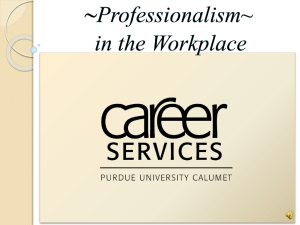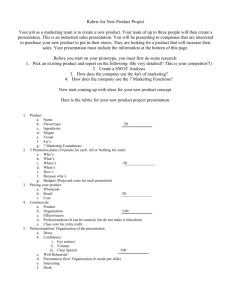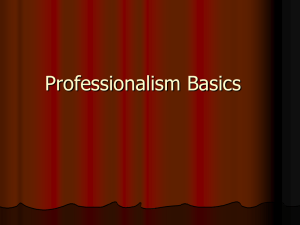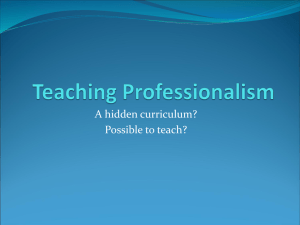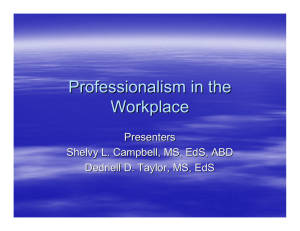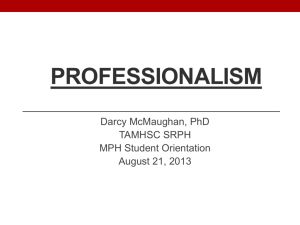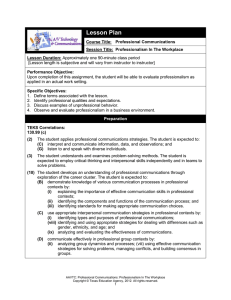Professionalism in the work place-longer version
advertisement
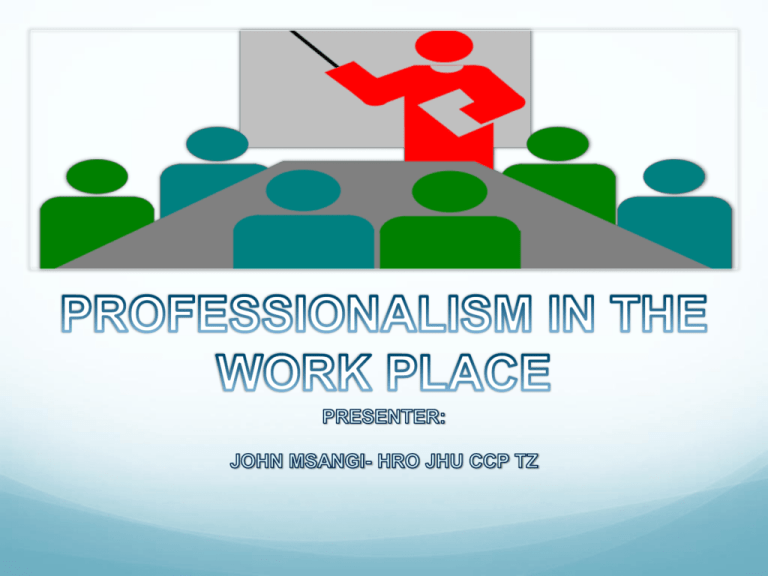
What is professionalism? Webster's Dictionary defines it as, "the conduct, aims, or qualities that characterize or mark a profession or a professional person." A specific style of behaviour in the work place. This means that professionalism is demonstrated in our behaviour and /or conduct in the work place Professionalism relates to a particular set of values and workplace behavior, ranging from appropriate business attire to considerate treatment of coworkers. Professional behavior in the workplace impacts the entire organization, affecting every aspect of day-to-day operations and ultimately impacting the company's bottom line. Unprofessional behavior in the workplace affects the morale of the team as a whole. Professionalism in the work place demands the following: Mature responsibility and show passion for your work Know how and achieve expected result Give appropriate feedback and on time to the co-workers and supervisor Respect for self and for others and their time Coming to work with a good attitude and performance Be friendly and a team player Problem solving perseverance Show a willingness to learn and volunteer for new tasks Important Keys to Being a True Professional in the work place: A good role model for others including, their behaviour, attitude and relationships Good Time Keepers - always in before time, uses time well Dresses appropriately for the role Speaks in a way which is appropriate to each different audience without being patronizing or putting people down. Knowledgeable about the job, organization, etc. Good with people Important Keys to Being a True Professional in the work place Cont. Communicate effectively, whatever the circumstances actively listens Works well under pressure Meets deadlines Offer positive contributions in the official meetings Prioritises effectively - Is prepared to put in the time and efforts to get things done, but also manages to have a reasonable work life balance Is accountable and takes responsibility for what they do and say, and for what they leave undone. Professional interaction Respect for colleagues is essential for workplace professionalism. Everyone has different ways of communicating and approaching issues – be tolerant of those differences and try to understand other perspectives. Communication is key. It’s okay to speak up and ask for clarification when you don’t understand something. Issues are simply the result of miscommunication and having one simple discussion can resolve the situation Individuals who listen and are open to the ideas and suggestions of their colleagues/supervisors demonstrate respectful behavior. Keep personal information personal. When you’re at work, you should limit personal phone calls, emails, texting and other communications. Give co-workers your undivided attention. Small actions, such as saying "please" and "thank you", help build collaborative workplace relationships and establish you as a professional who works well with others. Professional interaction cont. Email etiquette. So much business is conducted over e-mail, so it’s important to use this form of communication wisely. Poor grammar and spelling can come across as unprofessional and give the impression that you’re not taking your role seriously. You should also avoid adding emotional feelings (smiley faces, twinkle) and acronyms in your official e-mail massage. If you are trying to emphasize a point, try italicizing your word. Similarly, always use proper punctuation and capitalization. Do not start messages with “hey” or other casual phrases—always begin with “Dear…” Workplace e-mail is not Face book, Twitter or text messaging—it is a professional form of communication and should be taken seriously. Finally, if you are addressing your supervisor or a co-worker and especially your clients, address them formally in your e-mails. Professional Performance Being professional also means doing your work to the best of your ability. Excellence is the driving force of professionals. Job is something that overlaps with their passion. They put in their maximum efforts in getting the task done, without holding back, as they do it for themselves! Professionalism leads to positive thinking and people are only focused on the quality and quantity of the work. Accountability and personal responsibility are essential. This means showing up to the office on time, ready to work. If you’re going to be late to the office, call or email your supervisor to let them know. Individuals demonstrate ethical behavior through optimal performance and by not taking credit for the work of others. They show respect to their supervisor, follow instructions and are friendly to good faith criticism. Professional behaviour Have a clear-cut divide between your personal life and professional life. There is a famous saying “when at work leave your worries at home, and when at home leave your worries at work”. Respect other’s personal space. If a supervisor’s or co-worker’s door is closed, it general means he/she is busy. Always knock and wait for response. Avoid disrupting a person unless an issue at hand requires an immediate attention. Individuals act professionally by showing up on time for appointments and meetings, avoiding office gossip, answering phone calls in a timely and thoughtful manner. Abide by the office hours fixed by the organization. However, due to some unforeseen circumstances when unable to do so, they must inform the supervisor and HR office. Communicating differences of opinion respectfully and in the appropriate behaviour. Unprofessional, behavior can include gestures, words, expressions or other actions, such as acting bored during meetings to show disinterest. Professional appearance Your clothing creates an image of you. People form opinions based on the way you dress. When part of an organization, it is very essential that you follow the dress code specified by the organization. A dress code brings in uniformity to the workplace and forms part of the organization culture. Do not dress provocatively, a work place comprises different people, wear something that will help you fit in there. Refrain from using heavily scented perfume, or lotions that could bother co-workers How is professionalism in the work place judged? Your image/presentation Strongly influenced by culture of the organization. Against expectations or standards Professionalism is judged by the way you communicate with others in the workplace. It is reflected in your attitude and willingness to learn. Your job performance or conduct in general. Professionals judge themselves as part of the solution rather than the problem. Professionalism is in the eye of the beholder. THANK YOU
